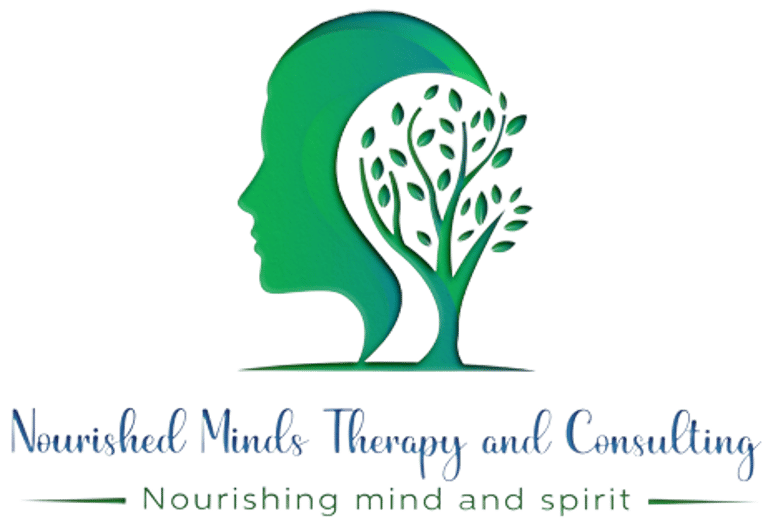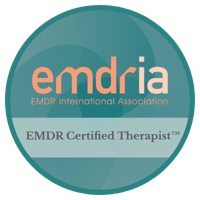Now scheduling EMDR Intensives!
Eating Disorders and Disordered Eating
Eating behaviors significantly impact physical and mental health. Understanding eating disorders and disordered eating, recognizing the seriousness of both, and knowing when to seek help is critical for overall well-being. Several individuals who seek treatment for mental health conditions such as trauma, anxiety, depression, or OCD often also have eating disorders or disordered eating patterns that go unnoticed and untreated, resulting in reduced progress or lack of progress in treatment.
Eating Disorders
Eating disorders are severe, diagnosable mental health conditions characterized by serious disturbances in eating habits. They often involve extreme focus on weight, body shape, and food, leading to dangerous behaviors and severe health consequences.
Common Eating Disorders
Anorexia Nervosa: Characterized by restricted food intake, intense fear of gaining weight, and a distorted body image. Individuals often see themselves as overweight, even when they are dangerously underweight.
Bulimia Nervosa: Involves cycles of binge eating followed by behaviors to prevent weight gain, such as vomiting, excessive exercise, or laxative use. These cycles can lead to severe physical and emotional problems.
Binge Eating Disorder: Characterized by recurrent episodes of eating large quantities of food, often quickly and to the point of discomfort. Unlike bulimia, these episodes are not followed by purging behaviors, leading to feelings of guilt, shame, and distress.
Avoidant/Restrictive Food Intake Disorder (ARFID): An eating disorder characterized by a persistent failure to meet nutritional needs due to a lack of interest in eating, avoidance based on sensory characteristics of food, or concern about aversive consequences of eating. Unlike other eating disorders, ARFID does not involve distress about body shape or weight, but it can lead to significant nutritional deficiencies and impaired social functioning.
Disordered Eating
Disordered eating refers to a range of irregular eating behaviors that may not warrant a diagnosis of a specific eating disorder but are still concerning and unhealthy. These behaviors can be serious and negatively affect one’s physical and mental health.
Examples of Disordered Eating
Chronic Dieting: Constantly engaging in restrictive diets; extreme adherence to dieting behavior, sometimes at the expense of social, relational or familial engagements.
Irregular Eating Patterns: Skipping meals, eating very little, or eating excessively at certain times.
Unhealthy Focus on Food: Obsessing over calories, food quality, or "clean eating" to an extreme.
Eating to Cope: Using food (or restricting food) as a primary coping mechanism for stress, sadness, boredom, or other emotions.
Other Specified Feeding or Eating Disorder (OSFED)
OSFED encompasses disordered eating patterns that cause significant distress or impairment but do not meet the full criteria for other eating disorders. These presentations are just as serious and can have profound physical and emotional effects.
Atypical Anorexia Nervosa:
All the features of anorexia nervosa are present—such as food restriction, fear of weight gain, and distorted body image—but the individual’s weight remains within or above the normal range. Despite not appearing underweight, medical complications and psychological distress can be severe.
Bulimia Nervosa (of low frequency or limited duration):
Individuals experience cycles of binge eating and compensatory behaviors (such as vomiting, fasting, or excessive exercise) that occur less often or for a shorter period than required for a full diagnosis of bulimia nervosa.
Binge Eating Disorder (of low frequency or limited duration):
Recurrent binge episodes occur with a sense of loss of control and emotional distress, but the frequency or duration is below the diagnostic threshold for binge eating disorder.
Purging Disorder:
Characterized by regular purging behaviors—such as self-induced vomiting, laxative misuse, or diuretic use—without binge eating episodes. This can lead to electrolyte imbalances, gastrointestinal issues, and significant emotional distress.
Night Eating Syndrome:
Involves recurrent episodes of eating after awakening from sleep or excessive food intake following the evening meal. Individuals may experience shame, disrupted sleep, and difficulty regulating mood or stress.
Orthorexia Nervosa:
Although not formally recognized in the DSM-5, orthorexia involves an obsession with eating foods perceived as “pure,” “clean,” or “healthy.” Over time, this fixation can lead to rigid food rules, social isolation, and nutritional deficiencies as more foods are deemed unacceptable.
Diabulimia:
A term used to describe individuals with Type 1 diabetes who deliberately restrict or omit insulin doses to control weight. This behavior can cause severe medical complications, including diabetic ketoacidosis, organ damage, and even death, and is often driven by deep distress around body image and control.
The Seriousness of Both Conditions
Both eating disorders and disordered eating have severe physical and psychological consequences. They can lead to:
Nutritional Deficiencies: Resulting in fatigue, weakened immune system, and various health problems.
Mental Health Issues: Including depression, anxiety, and low self-esteem, to name a few
Physical Health Problems: Such as heart issues, gastrointestinal problems, bone density loss, and even life-threatening conditions. Eating disorders have some of the highest mortality rates of any mental health disorder.
When to Seek Help
Recognizing the signs and seeking help early is vital for recovery. Consider seeking professional help if you or someone you know experiences:
Preoccupation with Weight, Food, and Body Image: Constantly thinking about food, dieting, or body shape to the detriment of other activities.
Drastic Changes in Eating Habits: Noticeable changes in eating patterns, such as skipping meals, or binge eating.
Physical Symptoms: Unexplained weight loss, digestive issues, or signs of malnutrition.
Emotional Distress: Feeling extreme guilt, shame, or anxiety related to eating or body image.
Behavioral Changes: Withdrawing from social activities, especially those involving food, or showing signs of secretive eating behaviors.
Treatment Options
Both eating disorders and disordered eating can be treated with a combination of therapies and support:
Therapy: Cognitive-Behavioral Therapy (CBT), Dialectical Behavior Therapy (DBT), Eye-Movement Desensitization and Reprocessing (EMDR), Intuitive Eating, Acceptance and Commitment Therapy (ACT), Internal Family Systems (IFS), Family Based Therapy (FBT), and other therapeutic approaches can help address the underlying psychological issues.
Nutritional Counseling: Working with an eating disordered trained registered dietitian to develop a balanced and healthy approach to eating.
Medical Monitoring: Regular check-ups with a healthcare provider to monitor physical health and address any potential medical complications
Support Groups: Connecting with others who understand and provide support through recovery.
Both eating disorders and disordered eating are serious conditions that require attention and care. If you or someone you know is struggling with these issues, don’t hesitate to seek professional help. Nourished Minds Therapy offers several empirically based treatment approaches that have been shown to be effective in the treatment of eating disorders and disordered eating. Visit our Therapeutic Approaches Page or Contact Me to find out how we can tailor a plan to support your mental wellness. You can also learn more by checking out my 4 part blog series, “What’s Eating You?”







